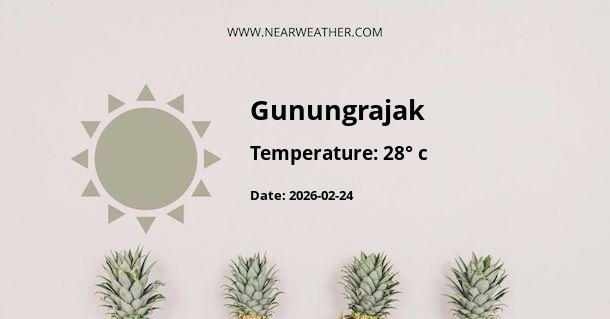Climate and Weather in Gunung Kidul, Indonesia
Gunung Kidul is a regency located in the Yogyakarta Special Region of Indonesia. The region is characterized by its diverse topography, ranging from coastal areas to hilly and mountainous terrain. The climate in Gunung Kidul is influenced by its geographical location near the equator, as well as its proximity to the Indian Ocean and the Java Sea. Understanding the weather patterns and climate variations in Gunung Kidul is essential for residents, tourists, and businesses operating in the region.
Annual Weather Overview
In Gunung Kidul, the climate is classified as tropical. The region experiences two primary seasons: the wet season and the dry season. The wet season typically occurs from November to March, while the dry season spans from April to October. During the wet season, the area receives significant rainfall, while the dry season is characterized by lower precipitation levels.
The table below provides a summary of the average monthly weather conditions in Gunung Kidul, including temperature and precipitation:
| Month | Temperature (°C) | Precipitation (mm) |
|---|---|---|
| January | 27 | 340 |
| February | 27 | 320 |
| March | 27 | 290 |
| April | 28 | 160 |
| May | 28 | 90 |
| June | 27 | 60 |
| July | 27 | 30 |
| August | 27 | 30 |
| September | 28 | 40 |
| October | 29 | 120 |
| November | 28 | 230 |
| December | 28 | 300 |
Temperature Variation
Throughout the year, Gunung Kidul experiences relatively consistent temperatures, with average highs ranging from 27°C to 29°C and lows ranging from 27°C to 28°C. This consistent temperature range is characteristic of tropical climates near the equator. The moderate temperature makes Gunung Kidul a pleasant destination for travelers seeking warm, tropical weather.
Rainfall Patterns
Rainfall in Gunung Kidul is heavily influenced by the Asian monsoon system. The wet season, which typically lasts from November to March, brings heavy rainfall to the region. During this period, the regency experiences an average of 200-340mm of precipitation per month. The dry season, from April to October, sees significantly reduced rainfall, with monthly averages ranging from 30mm to 160mm.
Microclimates and Topographical Influence
Gunung Kidul's diverse topography contributes to microclimates within the region. The low-lying coastal areas may experience slightly different weather patterns compared to the inland hilly and mountainous areas. Coastal regions may encounter sea breezes and higher humidity, while the elevated areas can experience cooler temperatures, especially during the night.
Ideal Time to Visit Gunung Kidul
The dry season, spanning from April to October, is generally considered the best time to visit Gunung Kidul for outdoor activities, exploration of natural attractions, and beach excursions. The reduced rainfall during this period provides favorable conditions for hiking, sightseeing, and enjoying the region's pristine beaches. However, travelers should be prepared for warmer temperatures during the dry season.
"Gunung Kidul offers a unique blend of natural beauty, cultural experiences, and outdoor adventures. The region's climate, with its distinct dry and wet seasons, plays a significant role in shaping the travel experiences of visitors throughout the year." - Local Tourism Board
Conclusion
In conclusion, Gunung Kidul's climate features a tropical classification with distinct wet and dry seasons. Understanding the region's weather patterns and temperature variations is crucial for residents, tourists, and businesses. By being aware of the annual climate trends, individuals can better plan their activities and make the most of their experiences in this captivating regency of Indonesia.
A - Gunungrajak's Latitude is -8.706700 & Longitude is 116.463203.
A - Weather in Gunungrajak is 28° today.
A - Climate Conditions in Gunungrajak shows overcast clouds today.
A - Humidity in Gunungrajak is 83% today.
A - Wind speed in Gunungrajak is 14.83 km/h, flowing at 284° wind direction. today.
